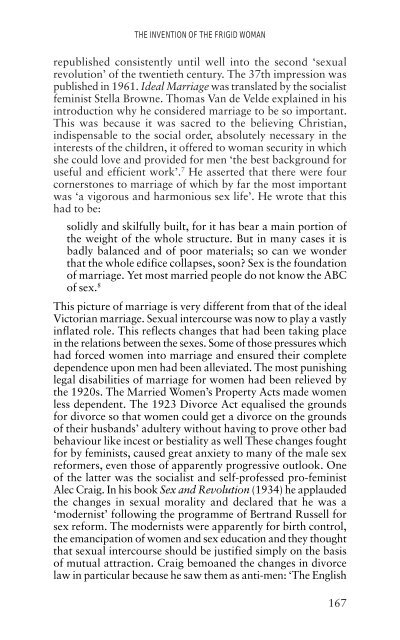The Spinster and Her Enemies - Feminish
The Spinster and Her Enemies - Feminish
The Spinster and Her Enemies - Feminish
You also want an ePaper? Increase the reach of your titles
YUMPU automatically turns print PDFs into web optimized ePapers that Google loves.
THE INVENTION OF THE FRIGID WOMAN<br />
republished consistently until well into the second ‘sexual<br />
revolution’ of the twentieth century. <strong>The</strong> 37th impression was<br />
published in 1961. Ideal Marriage was translated by the socialist<br />
feminist Stella Browne. Thomas Van de Velde explained in his<br />
introduction why he considered marriage to be so important.<br />
This was because it was sacred to the believing Christian,<br />
indispensable to the social order, absolutely necessary in the<br />
interests of the children, it offered to woman security in which<br />
she could love <strong>and</strong> provided for men ‘the best background for<br />
useful <strong>and</strong> efficient work’. 7 He asserted that there were four<br />
cornerstones to marriage of which by far the most important<br />
was ‘a vigorous <strong>and</strong> harmonious sex life’. He wrote that this<br />
had to be:<br />
solidly <strong>and</strong> skilfully built, for it has bear a main portion of<br />
the weight of the whole structure. But in many cases it is<br />
badly balanced <strong>and</strong> of poor materials; so can we wonder<br />
that the whole edifice collapses, soon? Sex is the foundation<br />
of marriage. Yet most married people do not know the ABC<br />
of sex. 8<br />
This picture of marriage is very different from that of the ideal<br />
Victorian marriage. Sexual intercourse was now to play a vastly<br />
inflated role. This reflects changes that had been taking place<br />
in the relations between the sexes. Some of those pressures which<br />
had forced women into marriage <strong>and</strong> ensured their complete<br />
dependence upon men had been alleviated. <strong>The</strong> most punishing<br />
legal disabilities of marriage for women had been relieved by<br />
the 1920s. <strong>The</strong> Married Women’s Property Acts made women<br />
less dependent. <strong>The</strong> 1923 Divorce Act equalised the grounds<br />
for divorce so that women could get a divorce on the grounds<br />
of their husb<strong>and</strong>s’ adultery without having to prove other bad<br />
behaviour like incest or bestiality as well <strong>The</strong>se changes fought<br />
for by feminists, caused great anxiety to many of the male sex<br />
reformers, even those of apparently progressive outlook. One<br />
of the latter was the socialist <strong>and</strong> self-professed pro-feminist<br />
Alec Craig. In his book Sex <strong>and</strong> Revolution (1934) he applauded<br />
the changes in sexual morality <strong>and</strong> declared that he was a<br />
‘modernist’ following the programme of Bertr<strong>and</strong> Russell for<br />
sex reform. <strong>The</strong> modernists were apparently for birth control,<br />
the emancipation of women <strong>and</strong> sex education <strong>and</strong> they thought<br />
that sexual intercourse should be justified simply on the basis<br />
of mutual attraction. Craig bemoaned the changes in divorce<br />
law in particular because he saw them as anti-men: ‘<strong>The</strong> English<br />
167

















